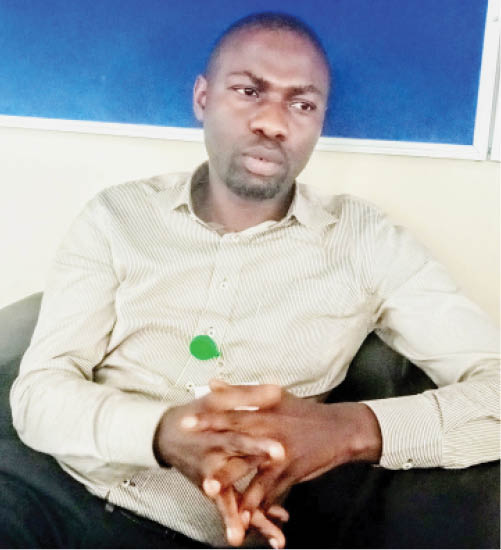‘Lack of platform, awareness responsible for low pro-bono culture’
Barrister Mutiu Akinsanya is the coordinator of “Building the Culture of Pro-bono in Nigeria”, a collaborative effort between Justice Research Institute (JRI), Open Society Initiative for West Africa (OSIWA) and the Nigerian Bar Association (NBA). In this interview, he identified lack of platform and awareness as major factors responsible for low pro-bono services by Nigerian […]

Barrister Mutiu Akinsanya
Barrister Mutiu Akinsanya is the coordinator of “Building the Culture of Pro-bono in Nigeria”, a collaborative effort between Justice Research Institute (JRI), Open Society Initiative for West Africa (OSIWA) and the Nigerian Bar Association (NBA). In this interview, he identified lack of platform and awareness as major factors responsible for low pro-bono services by Nigerian lawyers. Excerpts:
What motivated ‘Building the Culture of Pro-bono in Nigeria’ project?
It is a project aimed at providing free legal services to indigents and the disadvantaged in the society. We have a clearing house where we implement the project by getting lawyers to sign up and identify beneficiaries and then merge them with lawyers who then take up the cases free of any cost.
Unlike other climes in the world, it has been discovered that in Nigeria, pro-bono is not what it ought to be and this is despite the fact that we have the Legal Aid Council. This agency has its only challenges, including lack of adequate manpower. What this means is that NGOs also need to come together.
The NBA needs to do what it can to provide these services. So, identifying that this is a problem that needs a solution was the reason JRI came up with the idea and got other stakeholders to also key in to provide a platform to provide these services for the society.
What is responsible for low culture of pro-bono among lawyers?
A lot of lawyers do not know that there is a lot to be benefited apart from being paid for legal services. Apart from the fact that it is a requirement to becoming a Senior Advocate of Nigeria (SAN), it also gives fulfillment when you are giving back to the society. Also, the people benefiting from the services today may become great people tomorrow and may become sources of referrals of big clients to law firms and lawyers. So, the free services lawyers give out today may still come back to them in future with huge benefits.
For young lawyers, some of them may not be given the opportunities of taking full part in cases that come to their law firms, but if pro-bono cases come, they can participate fully in drafting of the processes, court appearances and these will help them in building their experience such that when they are faced with bigger cases, they will have the requisite experience to tackle whatever challenge that comes with such cases.
With all these benefits, what then is responsible for this low culture?
Partly, lack of awareness is a factor. But, again, there are a lot of people that are aware but probably for some of them the platform is also not there. With the platform that we have now, we have ways of getting the beneficiaries to show proof that they cannot afford services. So, it is after all the evaluation that we will now link them with a lawyer.
What is the procedure for lawyers and beneficiaries to be part of the project?
We have a portal and lawyers can sign up on www.probono.ng. We are working with several government agencies; we have written to the National Agency for the Prohibition of Trafficking in Persons (NAPTIP) and the National Human Rights Commission (NHRC). When we get these would-be-beneficiaries, we have to sign them up on the portal and then we merge them with lawyers. We expect the lawyers to take up the cases. We monitor the progress of those cases.
We are also aware of the challenges of the justice system in Nigeria which include delay, so we are working with various heads of courts. We are hoping they will give us waivers for filing fees and make cases coming from the pro-bono house to be fast tracked. If an indigent goes to court and the matter is done within few months that joy of getting justice will be there because justice delayed is justice denied.
What are the focus areas of this project?
The clearing house is working to expand its reach and impact in bringing justice to our vulnerable. Currently, we will be providing pro bono legal services in certain focus areas. They are: Domestic violence, child abuse, land displacement (in Kaduna), Sexual harassment and assault, disinheritance of widows and orphans, disinheritance by reason of gender, Unfair dismissal (employment matters with sexual harassment or discrimination undertones, Commercial Cases (involving oppression of indigent persons such as petty traders on matters such as unlawful taxation) and rape.
How many lawyers do you have on the project now?
Presently in Abuja we have about 30 lawyers and we are sure more will sign up. In Sokoto State, we have about 20 lawyers and handling over 50 cases at the moment. In Kaduna, we started last month and we have gotten about five lawyers on the project. We are just starting in Kebbi and Osun states. And in this month, we will be working with the local branches of the NBA in all these states.
Lawyers in Nigeria should embrace the project because even though there is no money in it, in the long run, they will benefit from it.
